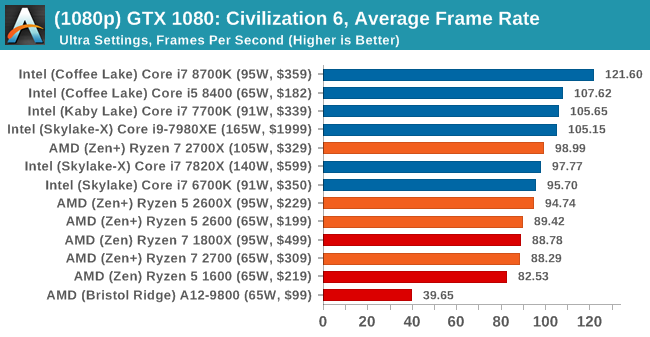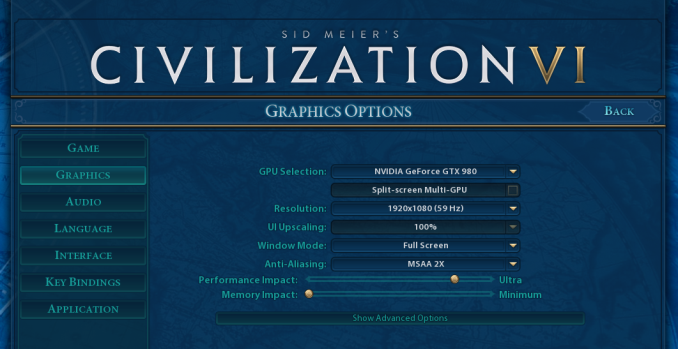The AMD 2nd Gen Ryzen Deep Dive: The 2700X, 2700, 2600X, and 2600 Tested
by Ian Cutress on April 19, 2018 9:00 AM ESTCivilization 6
First up in our CPU gaming tests is Civilization 6. Originally penned by Sid Meier and his team, the Civ series of turn-based strategy games are a cult classic, and many an excuse for an all-nighter trying to get Gandhi to declare war on you due to an integer overflow. Truth be told I never actually played the first version, but every edition from the second to the sixth, including the fourth as voiced by the late Leonard Nimoy, it a game that is easy to pick up, but hard to master.
Benchmarking Civilization has always been somewhat of an oxymoron – for a turn based strategy game, the frame rate is not necessarily the important thing here and even in the right mood, something as low as 5 frames per second can be enough. With Civilization 6 however, Firaxis went hardcore on visual fidelity, trying to pull you into the game. As a result, Civilization can taxing on graphics and CPUs as we crank up the details, especially in DirectX 12.
Perhaps a more poignant benchmark would be during the late game, when in the older versions of Civilization it could take 20 minutes to cycle around the AI players before the human regained control. The new version of Civilization has an integrated ‘AI Benchmark’, although it is not currently part of our benchmark portfolio yet, due to technical reasons which we are trying to solve. Instead, we run the graphics test, which provides an example of a mid-game setup at our settings.
At both 1920x1080 and 4K resolutions, we run the same settings. Civilization 6 has sliders for MSAA, Performance Impact and Memory Impact. The latter two refer to detail and texture size respectively, and are rated between 0 (lowest) to 5 (extreme). We run our Civ6 benchmark in position four for performance (ultra) and 0 on memory, with MSAA set to 2x.
For reviews where we include 8K and 16K benchmarks (Civ6 allows us to benchmark extreme resolutions on any monitor) on our GTX 1080, we run the 8K tests similar to the 4K tests, but the 16K tests are set to the lowest option for Performance.
All of our benchmark results can also be found in our benchmark engine, Bench.
MSI GTX 1080 Gaming 8G Performance
1080p



4K



8K



16K
















545 Comments
View All Comments
rocky12345 - Tuesday, April 24, 2018 - link
They ran all systems at both Intel's & AMD's listed specs as such AMD's memory was at 2933MHz on Zen+ & 2666MHz on Intel's Coffee lake 8700K,they did the same for the older gen parts as well and ran those at the spec's listed for them as well.There have been a few other media outlets that did the same thing and got the same results or very close to the same results. AMD's memory bandwidth as in memory controller seems to give more bandwidth than Intel's does at the same speed so with Intel not running at 3200MHz like most media outlets did maybe Intel loses a lot of performance because of that and AMD lost next to nothing from not going 3200MHz. It is all just guesses on my part at the moment.
Food for thought when Intel released the entire Coffee Lake line up they only released the z370 chip set which has full support for over clocking including the memory and almost all reviews were done with 3200MHz-3400MHz memory on the test beds even for the non K Coffee lakes CPU's. Maybe Intel knew this would happen and made sure all Coffee lakes looked their best in the reviews. For a few sites that retested once the lower tier chip sets were released the non K's using their rated memory speeds lost about 5%-7% performance in some cases a bit even more.
I am no fanboy of any company I just put out my opinions & theories that are based off of the information we are given by the companies and as well as the media sites.
Maxiking - Tuesday, April 24, 2018 - link
People never fail to amaze me, so you basically know nothing about the topic, yet you still managed to spit 4 paragraphs of mess, even made some "food for thought".Slower ram - performance regression unless you have big caches which is not the case of Intel nor AMD.
rocky12345 - Tuesday, April 24, 2018 - link
It seems pretty basic to me as to what was said in the post. It is not my problem if you do not under stand what myself and some others have said about this topic. Pretty simple slower memory less bandwidth which in turn will give less performance in memory intensive work loads such as most games. ALl you have to do is go and look at some benches in the reviews to see AMD has the upper hand when it comes to memory bandwidth even Hardware Unboxed was pretty surprised by how good AMD's memory controller when compared to Intel's. Yes Intel's can run memory at higher speeds than AMD but even with that said AMD does just fine. You are right about cache sizes neither has a overly large cache but AMD 's is bigger on the desktop class CPU's and that is most likely one of the reasons their bandwidth for memory is slightly better.Maxiking - Wednesday, April 25, 2018 - link
The raw bandwidth doesn't matter, it's cas latency what makes the difference here.https://www.anandtech.com/show/11857/memory-scalin...
https://imgur.com/MhqKfkf
With CL16, it doesn't look that much impressive, is it.
Now, lower the CL latencies to something more 2k18-ish, booom.
https://www.eteknix.com/memory-speed-large-impact-...
Another test
https://www.pcper.com/reviews/Processors/Ryzen-Mem...
Almost all the popular hw reviewers don't have a clue. They tell you to OC but do not explain why and what you should accomplish by overclocking. Imagine you have some bad hynix ram which can be barelly OC from 2666 to 3000mhz but you have to loose timing from CL15 for CL20 to get there.
mapesdhs - Monday, May 14, 2018 - link
schlock, the chips were run at official spec. Or are you saying it's AMD's fault that Intel doesn't officially support faster speeds? :D Also, GN showed that subtimings have become rather important for AMD CPUs; some mbds left on Auto for subtimings will make very good selections for them, giving a measurable performance advantage.peevee - Tuesday, April 24, 2018 - link
It is April 24th, and the page on X470 still states: "Technically the details of the chipset are also covered by the April 19th embargo, so we cannot mention exactly what makes them different to the X370 platform until then."jor5 - Tuesday, April 24, 2018 - link
The review is a shambles. They've gone to ground.coburn_c - Tuesday, April 24, 2018 - link
I have been wanting to read their take on x470..risa2000 - Wednesday, April 25, 2018 - link
It is my favorite page too.mpbello - Tuesday, April 24, 2018 - link
Today phoronix is reporting that after AMD's newest AGESA update their 2700X system is showing 10+% improvement on a number of benchmarks. It is unknown if on Windows the impact will be the same. But you see how all the many variables could explain the differences.